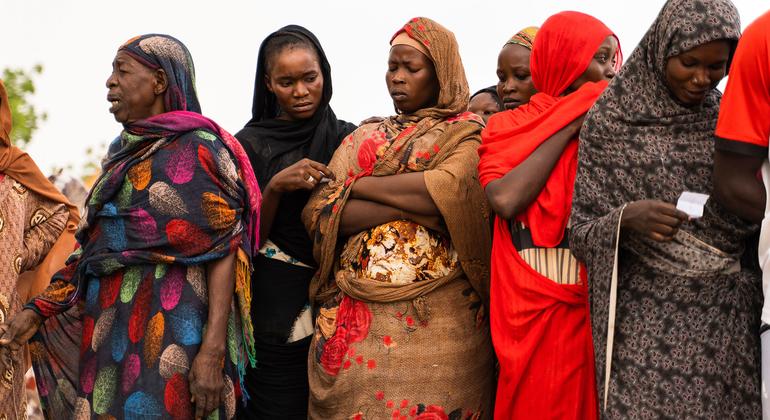Aid groups cite huge challenges in tackling new cholera outbreak in Sudan

“The needs in Sudan are huge; we are talking about people dying of hunger, we have conflict, we have protection issues, we have displacement every day.; the need is really great,” coupled with weeks of heavy rain, speak Kristine Hambrouck, United Nations High Commissioner for Refugees Representative in Sudan.
Famine ‘ongoing’
In addition to cholera, Famine is still “ongoing” in Zamzam camp near El Fasher townaccording to the World Health Organization of the United Nations (WHOThe report said 658 cases have been reported since the latest outbreak was declared on August 12, with 28 deaths. The most recent cholera outbreak in May saw more than 11,300 cases and at least 300 deaths.
Highlighting the dire humanitarian situation across Sudan, WHO also warned that At least 12 of Sudan’s 18 states now face three or more cholera outbreaks in addition to malaria, measles and/or dengue fever.
However, despite the urgent need for life-saving health interventions, the UN health agency said local resources and capacity to detect and respond to outbreaks remain limited, especially in hard-to-reach areas such as Darfur and Kordofan states.
Kassala, Gedaref, Jazirah in danger
Meanwhile, Ms Hambrouck of the UN refugee agency warned that cholera was spreading in areas where people were internally displaced by violence and people from other countries, especially the states of Kassala, Gedaref and Jazirah.
“We have seen a large number of cholera cases in Kassala; Kassala is an important area for us, it has a lot of refugees, but also internally displaced people. So far, we have had 119 cases of cholera in three refugee sites in Kassala and five refugees have sadly died from the disease.”
UNHCR officials have highlighted the difficulties in addressing this latest emergency in Sudan, where fighting between rival military forces erupted in April 2023 over a proposed transition to civilian rule, following a 2021 military coup and the 2019 overthrow of longtime President Omar Al-Bashir.
“This is just one (challenge), one challenge on top of all the others that we have to somehow re-prioritize and make sure that the investments are being made,” she said, noting that in refugee camps and displacement sites, “people live close together” and “overcrowded with displaced Sudanese (and) refugees from Khartoum, from Wad Madani, from Darfurs” to Kassala.
“All these areas have become overloaded, the existing water systems are not able to cope, really need huge investment,” she stressed.
Vaccine success
The initial vaccination campaign has successfully protected more than 50,000 people from cholera, and hundreds of thousands more doses of vaccine are being rolled out.
“The vaccination campaign has started and we have used 51,000 doses that were available in the country,” Dr Shible Sahbani, WHO Representative in Sudan, said. Speaking from Port Sudan, he confirmed that the vaccination campaign ended in Kassala state on Thursday.
“We aim to reach 97% of the target population,” he said, adding that the UN health agency had also secured approval to purchase an additional 455,000 doses of cholera vaccine – “good news in the midst of this terrible crisis”.

A family displaced by conflict settles at an internally displaced persons camp in Aj Jazirah, Sudan.
Elsewhere, aid access issues continue to disrupt the humanitarian response. “We are still facing a number of obstacles and challenges, either due to poor communication between decision-makers and those on the ground, or other issues. Of course, this is in addition to the other challenges of flooding and the quality of roads,” said Dr. Sahbani.
Echoing that message, the United Nations Office for the Coordination of Foreign Affairs, OCHAsay Fifteen trucks crossed into Sudan from Chad via the Adre border crossing earlier this week in a “step in the right direction”.
But spokesman Jens Laerke said transport conditions remained difficult due to the rainy season, stressing the importance of ensuring relief trucks could continue to pass through there “and ensuring a steady supply of food, nutrition, water, sanitation, hygiene and emergency medical care to people in more than a dozen areas at risk of famine”.
Seeds of Hope
The OCHA spokesperson noted that vital agricultural supplies, including seeds, were among the supplies being transported into Darfur. “This is a critical point, as they need to plant crops before the end of the rainy season. Increasing food production in Sudan is one of the most effective ways to address the worsening hunger crisis after more than 16 months of conflict.”
According to UNHCR, since the conflict began in Sudan, more than 10.3 million people have been forced to flee their homes inside Sudan or in neighboring countries.
The report stressed that the humanitarian situation and funding levels for the rescue response were “precarious” in the face of the latest cholera outbreak, and urgent funding was needed to support the expansion of cholera treatment centers and other health facilities, increase health staffing, and increase stocks of intravenous fluids and medicines.
Contingency plan failed
Of the $1.5 billion requested by UNHCR and other partners for the Regional Refugee Response Plan to provide assistance to countries bordering Sudan, only 22 percent has been received. The interagency response inside Sudan is only 37 percent funded.
“I think the funding levels are incredibly challenging and do not allow us to address all the needs, both in Sudan and across the border. So this really, really requires an international effort to make sure that we can at least stabilize this cholera situation,” said Hambrouck.


